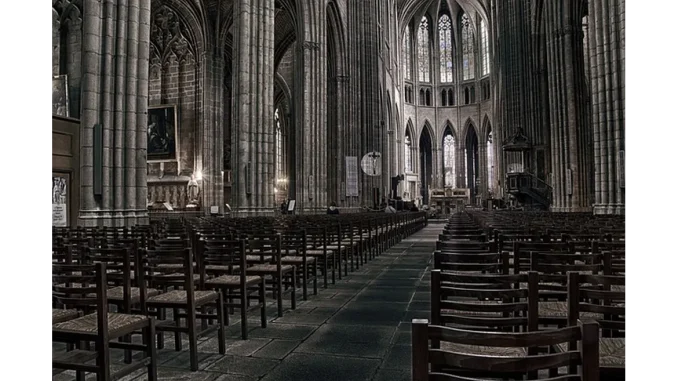
In an era where historical roots often feel increasingly tenuous, a remarkable coalition of nearly 50 distinguished British figures from various fields has united to champion the preservation of the Traditional Latin Mass. This movement, reminiscent of the “Agatha Christie letter” of 1971, seeks to ensure continued access to this ancient liturgical practice amid potential restrictions from the Vatican.
The “Agatha Christie letter” was a pivotal appeal to Pope Paul VI in 1971, urging him to permit the celebration of the pre-conciliar rite. Signatories included cultural luminaries such as Agatha Christie, Graham Greene, and Yehudi Menuhin. Their collective influence succeeded in securing an indult, allowing the Latin Mass to continue in England and Wales. This historic moment underscored the cultural and spiritual importance of the Latin Mass, a sentiment that today’s advocates echo fervently.
A new letter, published in The Times, extols the Latin Mass as a “cathedral of text and gesture,” a spiritual treasure fostering silence and contemplation. Orchestrated by Scottish composer Sir James MacMillan, a patron of the Latin Mass Society, the letter has garnered support from a diverse array of cultural, academic, and political figures, including Lord Moore of Etchingham, a notable convert to Catholicism. This coalition underscores the widespread reverence for the Latin Mass as an irreplaceable element of universal culture, arguing that it has inspired myriad achievements in the arts, from poetry and philosophy to music and architecture. The signatories beseech the Holy See to reconsider any further restrictions, emphasising the traditional liturgy’s unique capacity to encourage silence and contemplation.
In his accompanying article for The Times, Sir James MacMillan articulates his deep appreciation for the Latin Mass as both a cultural artifact and a profound shaper of collective heritage. He warns that any move to restrict the Latin Mass would be grossly unjust and would undermine the principles of synodality. MacMillan also frames the issue within the broader context of religious freedom, noting that the Church’s ability to celebrate different rites is a testament to its commitment to diversity, inclusion, and equity. His impassioned plea highlights the Latin Mass’s role not merely as a religious practice but as a key component of cultural continuity.
The original 1971 letter insisted that the Latin Mass was a vital part of universal culture, having inspired countless priceless achievements in the arts. This sentiment is echoed in the new appeal, which stresses that the eradication of the traditional liturgy would be an unnecessary and insensitive act in a world where history can too easily be forgotten. The signatories of the new letter include a broad spectrum of individuals, ranging from musicians and writers to politicians and human rights activists. Notable names include Robert Agostinelli, Lord Alton of Liverpool, Lord Bailey of Paddington, Sophie Bevan, Ian Bostridge, Nina Campbell, Michael Gove, Susan Hampshire, Bianca Jagger, Lord Lloyd-Webber, and Dame Kiri Te Kanawa, among others.
The appeal is ecumenical and non-political, drawing support from individuals of various religious backgrounds and beliefs. This broad endorsement underscores the Latin Mass’s significance beyond the confines of the Catholic Church, highlighting its importance as a cultural and historical treasure. Founded in 1965, the Latin Mass Society has long been a champion of the Traditional Latin Mass, advocating for its continued celebration in the form it assumed on the eve of the Second Vatican Council. The Society’s efforts have been reinforced by historical studies and petitions, attesting to the enduring relevance and importance of the ancient rite.
As the Vatican contemplates new restrictions, the voices of these prominent British figures serve as a potent reminder of the Latin Mass’s enduring value. Their appeal transcends a mere plea for the preservation of a religious practice; it is a call to safeguard a vital part of our collective cultural heritage. In a world increasingly disconnected from its past, the Latin Mass stands as a beacon of continuity, tradition, and spiritual profundity.
The unity and determination of the signatories offer hope that the Latin Mass will continue to inspire and nurture future generations. History has shown that the collective voice of cultural and intellectual leaders can indeed effect change, preserving the treasures of the past for the enrichment of both present and future. The Latin Mass Society’s press release underscores the letter’s significance, noting its appeal to the value of the ancient Mass as both a cultural artifact and an irreplaceable spiritual treasure. This broad support from non-Catholic cultural figures further highlights its place in global culture.
As the Vatican deliberates on new restrictions, the appeal from these eminent British figures stands as a compelling argument for the preservation of the Latin Mass. Their unified plea underscores the importance of maintaining this crucial part of our cultural and spiritual heritage, ensuring that it continues to inspire and nurture future generations. The Latin Mass, with its rich history and profound spiritual depth, remains a treasure worth preserving. The voices of those who have come together to advocate for its continued celebration serve as a powerful reminder of its enduring value. In a world where history can all too easily slip away forgotten, the Latin Mass stands as a testament to the beauty and continuity of tradition.


Be the first to comment